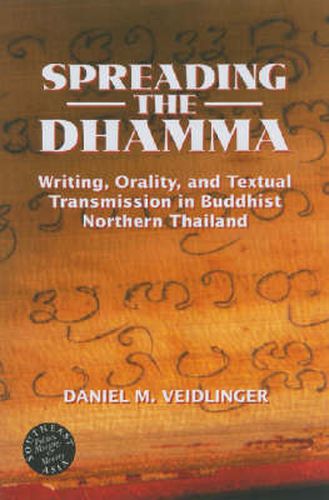Readings Newsletter
Become a Readings Member to make your shopping experience even easier.
Sign in or sign up for free!
You’re not far away from qualifying for FREE standard shipping within Australia
You’ve qualified for FREE standard shipping within Australia
The cart is loading…






How did early Buddhists actually encounter the seminal texts of their religion? What were the attitudes held by monks and laypeople toward the written and oral Pali traditions? In this pioneering work, Daniel Veidlinger explores these questions in the context of the northern Thai kingdom of Lan Na. Drawing on a vast array of sources, including indigenous chronicles, reports by foreign visitors, inscriptions, and palm-leaf manuscripts, he traces the role of written Buddhist texts in the predominantly oral milieu of northern Thailand from the fifteenth to the nineteenth centuries. Veidlinger examines how the written word was assimilated into existing Buddhist and monastic practice in the region, considering the use of manuscripts for textual study and recitation as well as the place of writing in the cultic and ritual life of the faithful. He shows how manuscripts fit into the economy, describes how they were made and stored, and highlights the understudied issue of the
cult of the book
in Theravada Buddhism. Looking at the wider Theravada world, Veidlinger argues that manuscripts in Burma and Sri Lanka played a more central role in the preservation and dissemination of Buddhist texts. By offering a detailed examination of the motivations driving those who sponsored manuscript production, this study draws attention to the vital role played by forest-dwelling monastic orders introduced from Sri Lanka in the development of Lan Na’s written Pali heritage. It also considers the rivalry between those monks who wished to preserve the older oral tradition and monks, rulers, and laypeople who supported the expansion of the new medium of writing.
$9.00 standard shipping within Australia
FREE standard shipping within Australia for orders over $100.00
Express & International shipping calculated at checkout
How did early Buddhists actually encounter the seminal texts of their religion? What were the attitudes held by monks and laypeople toward the written and oral Pali traditions? In this pioneering work, Daniel Veidlinger explores these questions in the context of the northern Thai kingdom of Lan Na. Drawing on a vast array of sources, including indigenous chronicles, reports by foreign visitors, inscriptions, and palm-leaf manuscripts, he traces the role of written Buddhist texts in the predominantly oral milieu of northern Thailand from the fifteenth to the nineteenth centuries. Veidlinger examines how the written word was assimilated into existing Buddhist and monastic practice in the region, considering the use of manuscripts for textual study and recitation as well as the place of writing in the cultic and ritual life of the faithful. He shows how manuscripts fit into the economy, describes how they were made and stored, and highlights the understudied issue of the
cult of the book
in Theravada Buddhism. Looking at the wider Theravada world, Veidlinger argues that manuscripts in Burma and Sri Lanka played a more central role in the preservation and dissemination of Buddhist texts. By offering a detailed examination of the motivations driving those who sponsored manuscript production, this study draws attention to the vital role played by forest-dwelling monastic orders introduced from Sri Lanka in the development of Lan Na’s written Pali heritage. It also considers the rivalry between those monks who wished to preserve the older oral tradition and monks, rulers, and laypeople who supported the expansion of the new medium of writing.